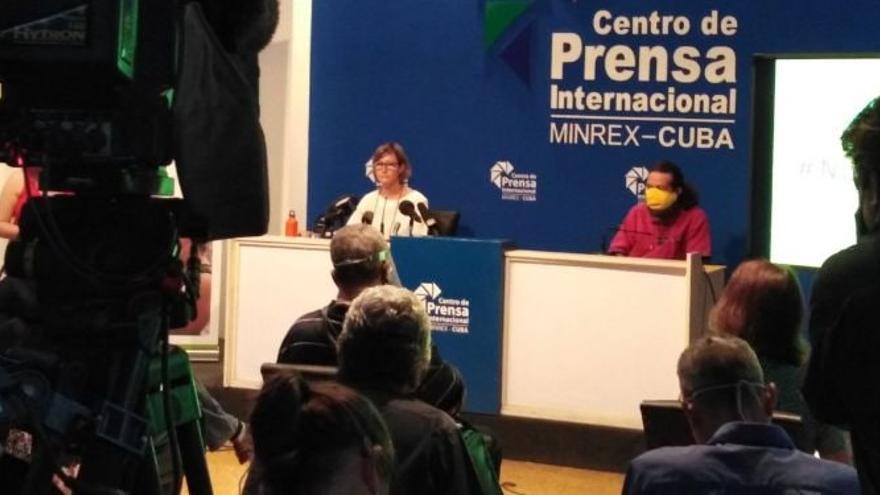
![]() 14ymedio, Madrid, 10 August 2021 — The Council for the Democratic Transition in Cuba has addressed a letter to Pepa Bueno, the new editor of the Spanish newspaper El País, in which it criticizes the coverage of its Havana correspondent, Mauricio Vicent. Specifically, they refer to the article entitled The Cuban government takes a mass bath to reaffirm itself after the protests, which reports on the demonstration called by the Cuban government last Thursday, the anniversary of the Maleconazo, in which it mentions that “tens of thousands of people” participated. The Council believes this “does not reflect reality.”
14ymedio, Madrid, 10 August 2021 — The Council for the Democratic Transition in Cuba has addressed a letter to Pepa Bueno, the new editor of the Spanish newspaper El País, in which it criticizes the coverage of its Havana correspondent, Mauricio Vicent. Specifically, they refer to the article entitled The Cuban government takes a mass bath to reaffirm itself after the protests, which reports on the demonstration called by the Cuban government last Thursday, the anniversary of the Maleconazo, in which it mentions that “tens of thousands of people” participated. The Council believes this “does not reflect reality.”
To illustrate this, the letter, signed by Manuel Cuesta Morúa and Elena Larrinaga, includes a link to the 14ymedio article on the same event, highlighting its headlines: “Lots of police but few ordinary people, in the official caravan on the day of the ’Maleconazo’. The cameras, which sought to amplify the event, could not hide a meager caravan of bikes, scooters, mopeds and cars.”
“We have been observing with some concern that the articles that arrive from Cuba lack, on many occasions, the objectivity that a correspondent should have, which compromises and reduces the credibility of the newspaper that you direct,” says the text.
The signatories noted that the newspaper has been defined, since its creation in 1976, as “a global, independent, quality newspaper and defender of democracy” and that it continues to be “the Spanish media of reference inside and outside of Spain.” For this reason, they say, they turn to the director, to whom they offer “any collaboration and supplementary information.”
“The Cuban people are living through extremely difficult times and we consider unrestricted support for the just demands for freedom of the population to be of vital importance,” they continue. “Certain euphemisms can lead to errors of appreciation that could have a very negative impact on the course of a legitimate process of political change in Cuba that is openly demanded by society.”
The Council is not the only one that has protested the articles by the Spanish correspondent. This weekend, user Ricky Castillo launched a petition on the Change.org platform “to denounce the coverage given by El País and Mauricio Vicent,” which has half a thousand signatures.
“With embarrassment and frustration we have seen the painful way in which your newspaper has covered the popular protests of July 11 and 12 in Cuba and the subsequent brutal repression against its participants,” says the petition, which regrets that despite the prevalence of the shouts “freedom” and “down with the dictatorship” in the demonstrations, “most of the reporters and commentators of your newspaper have made an effort to present them as a circumstantial reaction to the economic difficulties imposed by the embargo and the restrictions of the Covid-19.”
“The desire for freedom of so many Cubans after suffering the limitation of their most basic rights for more than 62 years is reduced by their newspaper to mere physiology,” it asserts.
The harsh text also says that “for years, El País has persisted in keeping as its main informant on Cuban affairs Mauricio Vicent, a poorly disguised apologist for the Cuban regime,” whom it comes to compare with the whitewashing of the worst years of Stalin in the Soviet Union by The New York Times journalist Walter Duranty.
Resident in Havana since 1984, Mauricio Vicent was a correspondent for El País, in a first stage, from 1991 to 2011. That year, a change in the editorial line of the Spanish newspaper caused him to slightly harden the tone of his chronicles against the Government of the Island, for which he had never hidden his sympathies.
Cuba’s International Press Center (CPI) cancelled, then, his accreditation as a correspondent and the official media lashed out against him. For Cuban officials, according to what El País published at the time, Vicent had offered “for a long time ’a partial and negative image’ of the Cuban reality, which had ’worsened’ in recent times.”
Despite this, he continued to live for a season on the island with his Cuban family. After rejoining the Newsroom of the newspaper in Madrid, he began to work in Culture. The return of El País to a more leftist line, starting in 2018, resulted in the newspaper and its correspondent being welcomed back on the Island.
____________
COLLABORATE WITH OUR WORK: The 14ymedio team is committed to practicing serious journalism that reflects Cuba’s reality in all its depth. Thank you for joining us on this long journey. We invite you to continue supporting us by becoming a member of 14ymedio now. Together we can continue transforming journalism in Cuba.
